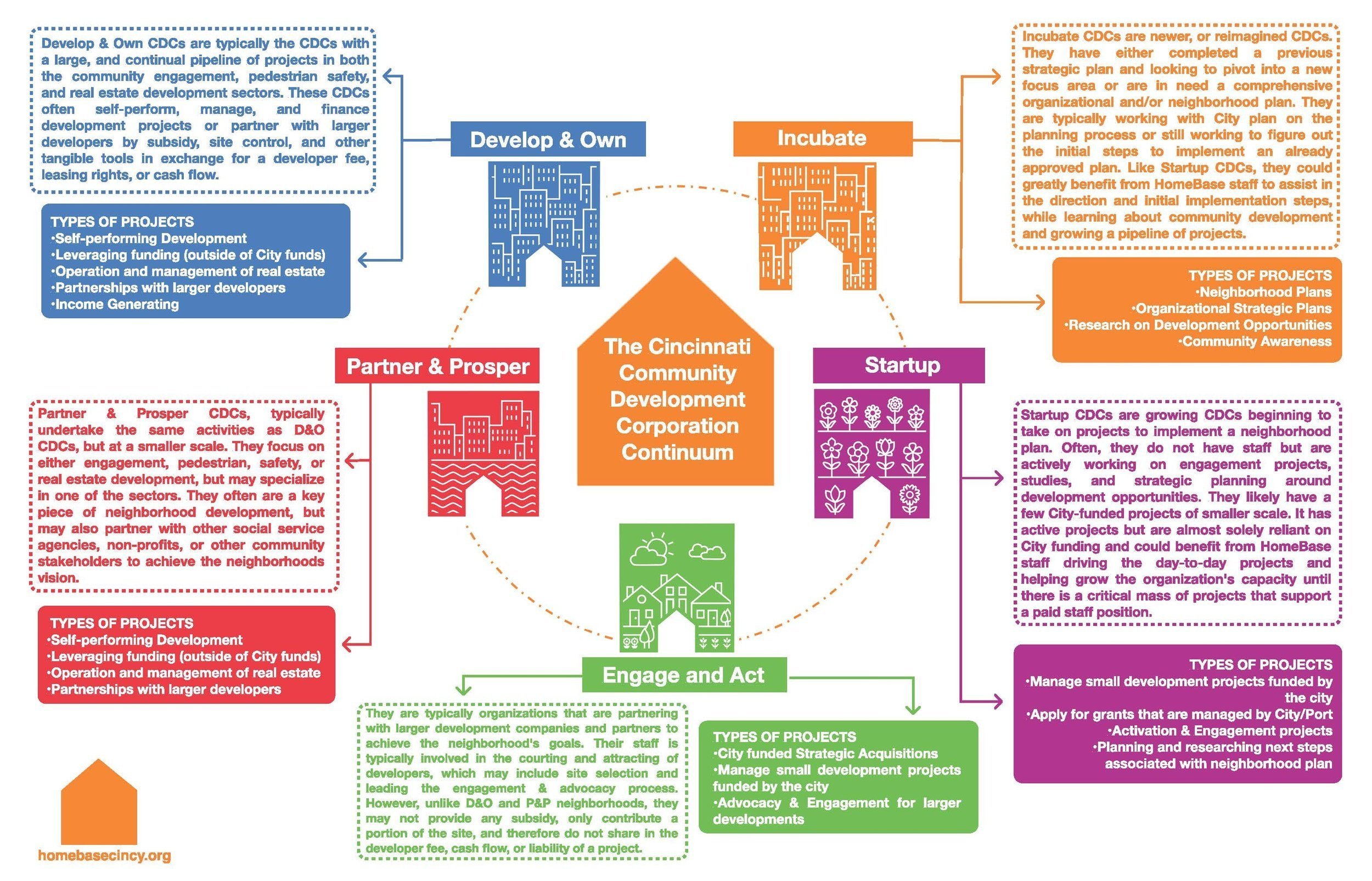Operating Support Grant
Building and strengthening the capacity of CDCs.
The Operating Support Grant (OSG) is a U.S. Department of Housing and Urban Development (HUD) funding source under HUD’s Community Development Block Grant (CDBG).
OSG is a competitive funding source made available through the City of Cincinnati Department of Community and Economic Development and is delivered to Community Development Corporations (CDCs) through HomeBase.
The OSG program provides operating and project support to build and strengthen capacity of eligible non‐profit CDCs. Eligible entities serve the region through developing affordable housing units, performing commercial and economic development, addressing public facilities and streetscape activities, violence prevention/reduction, neighborhood safety, and increasing community engagement in the neighborhoods.
For more information on the City’s involvement in the OSG CDC funding process, please reach out to Bob Bertsch and/or Joseph Malek at the Department of Community and Economic Development.
The 2025-2026 Operating Support Grant Application is now closed.
Eligibility Criteria
To be eligible for funding, organizations must meet HUDs criteria of community development criteria as well as support the objectives for CDBG laid out in the City's Consolidated Plan for the CDBG allocation (see below). All applications must be received by 5/23/25 at 11:59PM to be considered.
Per U.S. Department of Housing and Urban Development (HUD):
Community development activities build stronger and more resilient communities.
In order to be eligible for (HUD) funding, CDC activity must qualify as meeting the following national objectives of HUD’s Community Development Block Grant (CDBG):
Benefiting low- and moderate-income persons,
Preventing or eliminating slum or blight, or
Meeting other community development needs having a particular urgency because existing conditions pose a serious and immediate threat to the health or welfare of the community and other financial resources are not available to meet such needs.
Community Development Corporations (CDCs) are 501(c)(3) non-profit organizations that are created to support and revitalize communities, especially those that are impoverished or struggling. (Eligible for CDBG.)
A Community Housing Development Organizations (CHDO) is a type of CDC that is a private nonprofit, community-based organization that has staff with the capacity to develop and focus on affordable housing for the community it serves. CHDO is an official designation from HUD and must be renewed year to year. (CHDOs are also eligible for HOME funds.)
Review and Recommendation Committee Process:
The OSG Application Review & Recommendation Committee is made up of two City DCED staff and up to five other non-partisan members that are familiar with the community development ecosystem, seven total committee members. Per HomeBase’s agreement with the City of Cincinnati, a conflict of interest policy is in place so that no applying CDC employee, or person affiliated with an applying CDC board within the City of Cincinnati can be a part of the selection process.
The committee will review the applications and host a Question + Answer session with each applicant to ask clarifying questions about their application. Individual committee members score each CDC’s application and the scores are averaged. The average of those seven scores represents the committee’s final score for each application.
Recognizing there is not enough available funding to fund each applicant 100%, the final scores are used to categorize each CDC’s capacity level to effectively utilize funds within the federally mandated time frame, as well as meet federal reporting requirements and key performance measures (KPMs). These categories determine the level of funding recommendations from the committee to the City’s Department of Community and Economic Development, with DCED making final funding determinations.
Important Information
Please register here for the the OSG Virtual Information Session: Tuesday, May 6th at 12pm.
Application Form (PDF Version) - **Updated 5/13/25** This form is provided solely for the purposes of referencing and prewriting responses for the online application should applicants prefer. All final responses must be submitted to the online application form.
Timeline - Review and announcement dates are subject to change.
KPMs: Blank KPM sheet with KPM definitions and examples
Cincinnati CDC Continuum - Diagram and Language.
Scorecard - **Updated 5/13/25** This form is provided to help applicants align their responses with the sections outlined in the scorecard.
Questions? Reach out to alexus.wimbish@homebasecincy.org
CINCINNATI CDC CONTINUUM
HomeBase recognizes and supports the diversity of our City’s neighborhoods and the community development ecosystem. No two neighborhoods, nor CDC’s, look exactly alike, but are oftentimes involved in similar activities across a spectrum of community development efforts and capacities.
Some community-based organizations may be volunteers only, not involved in the real estate development aspects of their community yet, but are laying the foundation to do so by creating a comprehensive neighborhood plan. Some CDC’s have been building on their community plans for decades – revisiting and tweaking their plans to match the flux and needs of their residents, with development-based revenue streams and paid staff.
HomeBase supports the neighborhood-based community development continuum however we are needed – whether a startup community-based organization or a formal CDC operating by HUD and/or NACEDA definitions.
View the 2023-2034 Operational Support Grant awardees.
Download the 2023-2024 Operational Support Grant application.
An important note: Previously, CDC application scores were put into “Tiers 1-4.” These tiers were a way to categorize from the highest to the lowest scoring applications. This scoring method was not a reflection of the applicant CDCs, only the OSG application score. Much like grading in school, scores or grades fall upon a Bell Curve, and the previous “Tier” terminology was a way to define and categorize scoring only, e.g., the highest scores fell into “Tier 1” while the lowest in “Tier 4.” In an effort to better explain the OSG process and what these “Tiers” mean, the committee added language and descriptions to the categories of Community Development Corporations, and these additions can be found in the below “Cincinnati CDC Continuum” infographic.




